第50章 VI(8)
A stout, chubby-faced fellow of medium height, from head to foot the evident son of a hat-maker, with round features whose shrewdness was hidden under a restrained and subdued manner, suddenly appeared. His face, which was melancholy, like that of a man weary of poverty, lighted up hilariously when he caught sight of the table, and the bottles swathed in significant napkins. At Gaudissart's shout, his pale-blue eyes sparkled, his big head, hollowed like that of a Kalmuc Tartar, bobbed from right to left, and he bowed to Popinot with a queer manner, which meant neither servility nor respect, but was rather that of a man who feels he is not in his right place and will make no concessions. He was just beginning to find out that he possessed no literary talent whatever; he meant to stay in the profession, however, by living on the brains of others, and getting astride the shoulders of those more able than himself, making his profit there instead of struggling any longer at his own ill-paid work. At the present moment he had drunk to the dregs the humiliation of applications and appeals which constantly failed, and he was now, like people in the higher walks of finance, about to change his tone and become insolent, advisedly. But he needed a small sum in hand on which to start, and Gaudissart gave him a share in the present affair of ushering into the world the oil of Popinot.
"You are to negotiate on his account with the newspapers. But don't play double; if you do I'll fight you to the death. Give him his money's worth."
Popinot gazed at "the author" which much uneasiness. People who are purely commercial look upon an author with mingled sentiments of fear, compassion, and curiosity. Though Popinot had been well brought up, the habits of his relations, their ideas, and the obfuscating effect of a shop and a counting-room, had lowered his intelligence by bending it to the use and wont of his calling,--a phenomenon which may often be seen if we observe the transformations which take place in a hundred comrades, when ten years supervene between the time when they leave college or a public school, to all intents and purposes alike, and the period when they meet again after contact with the world.
Andoche accepted Popinot's perturbation as a compliment.
"Now then, before dinner, let's get to the bottom of the prospectus;
then we can drink without an afterthought," said Gaudissart. "After dinner one reads askew; the tongue digests."
"Monsieur," said Popinot, "a prospectus is often a fortune."
"And for plebeians like myself," said Andoche, "fortune is nothing more than a prospectus."
"Ha, very good!" cried Gaudissart, "that rogue of a Finot has the wit of the forty Academicians."
"Of a hundred Academicians," said Popinot, bewildered by these ideas.
The impatient Gaudissart seized the manuscript and began to read in a loud voice, with much emphasis, "CEPHALIC OIL."
"I should prefer /Oil Cesarienne/," said Popinot.
"My friend," said Gaudissart, "you don't know the provincials; there's a surgical operation called by that name, and they are such stupids that they'll think your oil is meant to facilitate childbirth. To drag them back from that to hair is beyond even my powers of persuasion."
"Without wishing to defend my term," said the author, "I must ask you to observe that 'Cephalic Oil' means oil for the head, and sums up your ideas in one word."
"Well, let us see," said Popinot impatiently.
Here follows the prospectus; the same which the trade receives, by the thousand, to the present day (another /piece justificative/):--
GOLD MEDAL EXPOSITION OF 1819
CEPHALIC OIL
Patents for Invention and Improvements.
"No cosmetic can make the hair grow, and no chemical preparation can dye it without peril to the seat of intelligence. Science has recently made known the fact that hair is a dead substance, and that no agent can prevent it from falling off or whitening. To prevent Baldness and Dandruff, it is necessary to protect the bulb from which the hair issues from all deteriorating atmospheric influences, and to maintain the temperature of the head at its right medium. CEPHALIC OIL, based upon principles laid down by the Academy of Sciences, produces this important result, sought by the ancients,--the Greeks, the Romans, and all Northern nations,--to whom the preservation of the hair was peculiarly precious. Certain scientific researches have demonstrated that nobles, formerly distinguished for the length of their hair, used no other remedy than this; their method of preparation, which had been lost in the lapse of ages, has been intelligently re-discovered by A. Popinot, the inventor of CEPHALIC OIL.
"To /preserve/, rather than provoke a useless and injurious stimulation of the instrument which contains the bulbs, is the mission of CEPHALIC OIL. In short, this oil, which counteracts the exfoliation of pellicular atoms, which exhales a soothing perfume, and arrests, by means of the substances of which it is composed (among them more especially the oil of nuts), the action of the outer air upon the scalp, also prevents influenzas, colds in the head, and other painful cephalic afflictions, by maintaining the normal temperature of the cranium. Consequently, the bulbs, which contain the generating fluids, are neither chilled by cold nor parched by heat. The hair of the head, that magnificent product, priceless alike to man and woman, will be preserved even to advanced age, in all the brilliancy and lustre which bestow their charm upon the heads of infancy, by those who make use of CEPHALIC
OIL.
"DIRECTIONS FOR USE are furnished with each bottle, and serve as a wrapper.
"METHOD OF USING CEPHALIC OIL.--It is quite useless to oil the hair; this is not only a vulgar and foolish prejudice, but an untidy habit, for the reason that all cosmetics leave their trace.